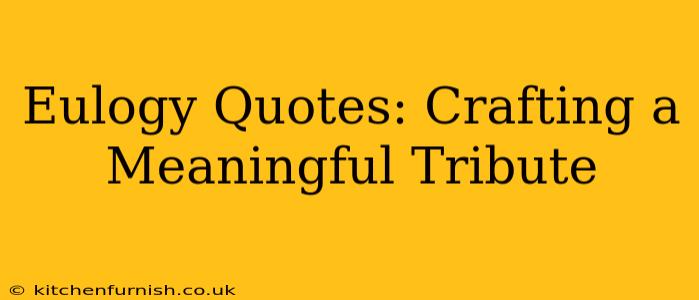Saying goodbye to a loved one is one of life's most challenging experiences. A eulogy offers a powerful opportunity to honor their memory, celebrate their life, and offer comfort to those grieving. Crafting a meaningful eulogy requires careful consideration, reflecting not just on the deceased but also on the impact they had on the lives of others. This guide will help you navigate the process of selecting and incorporating eulogy quotes, creating a tribute that truly captures the essence of the person you're remembering.
What Makes a Good Eulogy Quote?
A strong eulogy quote resonates with the audience and accurately reflects the personality and spirit of the deceased. It shouldn't be overly formal or cliché; instead, it should feel authentic and personal. Consider quotes that:
- Highlight their personality: Did they have a signature phrase? Were they known for their humor, kindness, or strength? The quote should reflect these defining traits.
- Capture their values: What was important to them? Family, faith, community, justice? A quote expressing these values adds depth and meaning.
- Offer comfort and hope: While acknowledging the sadness of loss, a good eulogy offers solace and a sense of continuing legacy.
Finding the Perfect Eulogy Quotes: Where to Look
Finding the right quotes can be a journey in itself. Don't limit yourself to only formal sources. Consider these options:
- Literature and Poetry: Classic works offer timeless expressions of love, loss, and hope. Poems like "Do Not Stand at My Grave and Weep" by Mary Elizabeth Frye are often used in eulogies.
- Religious Texts: If the deceased held strong religious beliefs, incorporating relevant verses or passages can be deeply meaningful.
- Personal Letters and Writings: Exploring the deceased's own words—journals, letters, or even social media posts—can reveal their innermost thoughts and feelings. A quote directly from them adds a unique and intimate touch.
- Inspirational Quotes: Quotes from well-known figures can provide a framework for reflection on life's bigger questions. However, ensure the quote aligns with the individual's personality and beliefs.
- Shared Memories: Quotes reflecting shared experiences and inside jokes can add a personal and comforting touch, creating a sense of shared grief and remembrance.
How to Incorporate Eulogy Quotes Effectively
Simply quoting someone isn't enough. You need to weave these quotes into the narrative of your eulogy. Consider these strategies:
- Contextualize the quote: Explain why you chose that specific quote and how it relates to the deceased's life and personality. Don't just drop the quote in; connect it to a specific anecdote or memory.
- Use the quote as a springboard: Use the quote to transition into a different aspect of the deceased's life or to introduce a new story.
- Don't overuse quotes: A eulogy is about your personal tribute, not a collection of famous sayings. Use quotes sparingly and strategically.
What if I Can't Find the Perfect Quote?
Don't stress if you're struggling to find the perfect quote. The most important aspect of a eulogy is the sincerity and authenticity of your words. Even without a formal quote, you can still craft a deeply moving tribute by sharing personal stories and expressing your genuine feelings.
What are some examples of Eulogy Quotes?
Many beautiful and poignant quotes exist to capture the essence of loss and remembrance. Examples include: "What we have once enjoyed we can never lose. All that we love deeply becomes a part of us.” – Helen Keller. This speaks to the enduring impact of loved ones. Or, "Death leaves a heartache no one can heal, love leaves a memory no one can steal." - Richard Puz. This highlights both the pain of loss and the enduring power of love. Remember to carefully select a quote that resonates deeply with both the deceased's life and the sentiments you wish to convey.
What should I avoid when choosing eulogy quotes?
Avoid overly sentimental or cliché quotes that lack depth and personal connection. Steer clear of quotes that don't accurately reflect the deceased's personality or beliefs. Overusing quotes can also detract from the overall impact of your eulogy; focus on sharing personal anecdotes and genuine reflections to create a truly memorable tribute.
How do I write a eulogy that doesn't sound generic?
To avoid a generic eulogy, focus on specific anecdotes and memories that illustrate the deceased's unique qualities and personality. Weave in your own personal experiences and emotions, allowing your genuine affection and respect to shine through. Sharing inside jokes or referencing shared experiences will create a more intimate and personalized tribute.
By following these tips, you can craft a eulogy that is both moving and meaningful, a lasting tribute to the life you are celebrating. Remember, the most important element is your heartfelt words and genuine remembrance.

